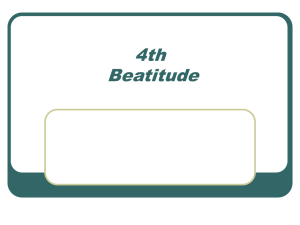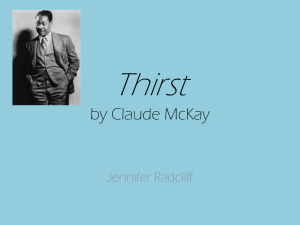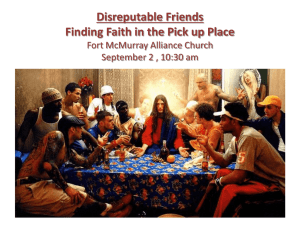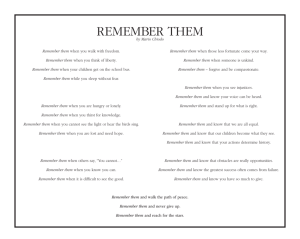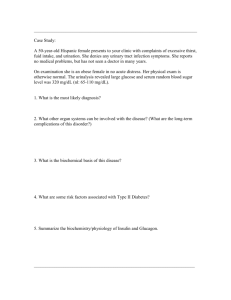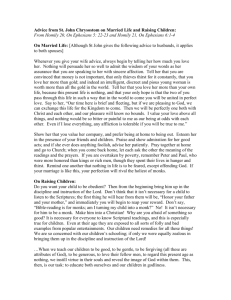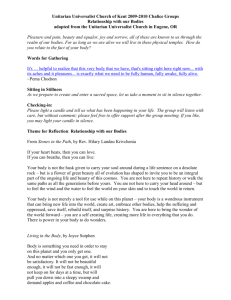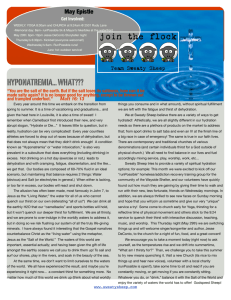Deeper Wells
advertisement
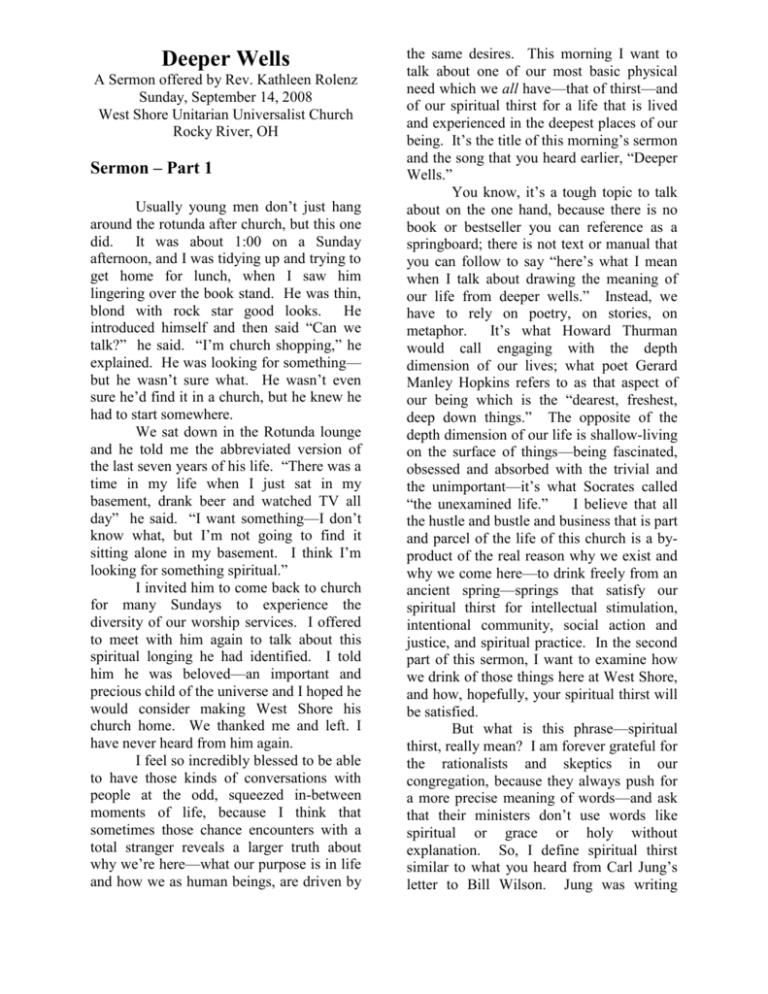
Deeper Wells A Sermon offered by Rev. Kathleen Rolenz Sunday, September 14, 2008 West Shore Unitarian Universalist Church Rocky River, OH Sermon – Part 1 Usually young men don’t just hang around the rotunda after church, but this one did. It was about 1:00 on a Sunday afternoon, and I was tidying up and trying to get home for lunch, when I saw him lingering over the book stand. He was thin, blond with rock star good looks. He introduced himself and then said “Can we talk?” he said. “I’m church shopping,” he explained. He was looking for something— but he wasn’t sure what. He wasn’t even sure he’d find it in a church, but he knew he had to start somewhere. We sat down in the Rotunda lounge and he told me the abbreviated version of the last seven years of his life. “There was a time in my life when I just sat in my basement, drank beer and watched TV all day” he said. “I want something—I don’t know what, but I’m not going to find it sitting alone in my basement. I think I’m looking for something spiritual.” I invited him to come back to church for many Sundays to experience the diversity of our worship services. I offered to meet with him again to talk about this spiritual longing he had identified. I told him he was beloved—an important and precious child of the universe and I hoped he would consider making West Shore his church home. We thanked me and left. I have never heard from him again. I feel so incredibly blessed to be able to have those kinds of conversations with people at the odd, squeezed in-between moments of life, because I think that sometimes those chance encounters with a total stranger reveals a larger truth about why we’re here—what our purpose is in life and how we as human beings, are driven by the same desires. This morning I want to talk about one of our most basic physical need which we all have—that of thirst—and of our spiritual thirst for a life that is lived and experienced in the deepest places of our being. It’s the title of this morning’s sermon and the song that you heard earlier, “Deeper Wells.” You know, it’s a tough topic to talk about on the one hand, because there is no book or bestseller you can reference as a springboard; there is not text or manual that you can follow to say “here’s what I mean when I talk about drawing the meaning of our life from deeper wells.” Instead, we have to rely on poetry, on stories, on metaphor. It’s what Howard Thurman would call engaging with the depth dimension of our lives; what poet Gerard Manley Hopkins refers to as that aspect of our being which is the “dearest, freshest, deep down things.” The opposite of the depth dimension of our life is shallow-living on the surface of things—being fascinated, obsessed and absorbed with the trivial and the unimportant—it’s what Socrates called “the unexamined life.” I believe that all the hustle and bustle and business that is part and parcel of the life of this church is a byproduct of the real reason why we exist and why we come here—to drink freely from an ancient spring—springs that satisfy our spiritual thirst for intellectual stimulation, intentional community, social action and justice, and spiritual practice. In the second part of this sermon, I want to examine how we drink of those things here at West Shore, and how, hopefully, your spiritual thirst will be satisfied. But what is this phrase—spiritual thirst, really mean? I am forever grateful for the rationalists and skeptics in our congregation, because they always push for a more precise meaning of words—and ask that their ministers don’t use words like spiritual or grace or holy without explanation. So, I define spiritual thirst similar to what you heard from Carl Jung’s letter to Bill Wilson. Jung was writing specifically about alcoholism, but he said “his craving…was the equivalent, on a low level, of the spiritual thirst of our being for wholeness, expressed in medieval language: the union with God.” Jung’s letter goes beyond this particular reflection on Roland H, and points to that which why I think we come to church. The non-theist may choose to use Jung’s secular language of having a thirst for wholeness; the theist may say “union with God,” and both and others are an acceptable way of saying the same thing in this church. The truth that runs underground and connects all of us is the fact that everybody thirsts—both physically, emotionally, and spiritually. How to name this thirst? It’s easiest to understand our physical thirst, composed as it is of pure science. If the water volume of the body falls below a certain threshold, or the osmolite concentration becomes too high, the brain signals thirst. Although there are such things as extra-cellular and intracellular thirst, the craving for water is generated from central processing in the brain, no matter how it is detected in the cells. Common wisdom says that it is better to drink enough water to stave off the feeling of being thirsty, because being thirsty is a sign that you are too dehydrated, and you’ve got some catching up to do. That young man who visited West Shore about a month ago, came to West Shores well, interesting, the Rotunda, which is shaped like an inverted well, because I believe he was thirsty, and wondered if we had that which would satisfy—so he was driven by that need, just as, I suspect, many of us are. So what’s your need? What are you thirsty for? I know for me, much of my young adult life was driven by a thirst for depth. I resonated with the famous quote by Henry David Thoreau, who said: “I wanted to live deep and suck out all the marrow of life, to live so sturdily and Spartan-like as to put to rout all that was not life, to reduce it to its lowest terms, and, if proved to be mean, why then to get the whole and genuine meanness of it, and publish its meanness to the world." I had two lists in my head back then—deep and not deep; films by Ron Howard—not deep. Films by David Lynch—deep. Paintings by Bouguereau—not deep. Paintings by Francis Bacon—deep. Before I became involved in a Unitarian Universalist Church—most churches—not deep; hypocritical; pure philosophy of the mind— deep. What I was trying to look for by labeling things deep or not deep—is actually what I believe the Buddhist call “enlightenment,” or the state of Samadhi. It’s awareness of not just things—but the meaning of things. Not just a trip to the grocery store to get food, but a profound awareness of all has led up to that moment. Not just a visit to a relative in a nursing home, but holding the memory of his or her vitality close—not in a sentimental way, but as an acknowledgement of the depth and breadth of the life we live. This understanding of the deeper wells of our life is what I hope this church can provide for you. Later in life, I came to understand that dividing the world into things that are sacred—“deep” and things that are shallow as profane is a false dichotomy. There is the possibility of spiritual depth in everything, and it is our task as religious and spiritual human beings, to uncover it, to live with it, to find the meaning in it and to share it with others. Ideally, if that young man had encountered one of you instead of me, you would have been able to sit down with him, just as I did, and share your story with him, and tell him how this faith tradition has encouraged your own spiritual depth—has enhanced your understanding of your union with God; or your quest for wholeness. There are many good stories from the world’s religious traditions that talk about this thirst we have for wholeness—for union with God—for, as one of our hymns go, the life of the larger liberty, but the one that speaks to me most plainly and provocatively is the one in the book of John, 2 when Jesus meets a woman at a well. In order to tell this story, or in theological parlance, exegete this story—I have to set it up for you, because it’s not just a random encounter between a Samaritan woman and a traveling Jew. The story is set in Samaria, which is about 35 miles north of Jerusalem. Samarians were a mixed-race people; born of the intermarriage between Jews, Assyrians and Babylonians. Jews viewed their religion as corrupted Judaism—unpure, and many more orthodox Jews would go out of their way to avoid traveling in Samaria, but Jesus is interested in visiting Jacob’s well—a place that has both real and symbolic value. Jacobs well was the deepest one in the area—maybe a hundred feet deep some archeologist speculate. It is mid day— it is hot—he is thirsty--and he is alone. He has no bucket, no cup, no access to water. A woman comes to the well and they start to talk. That in and of itself is strange because townswomen would come to the well first thing in the morning, and in a group. Why was this woman coming by herself in the middle of the day? He asks for a drink of water and she asks him, incredulously, how is it that you—a Jew—ask me, a woman and a Samaritan, for something to drink? (For Jews have nothing in common with Samaritans) So, Jesus isn’t supposed to be there in the first place; secondly, he’s talking to a woman who is alone, which is unheard of in a segregated and patriarchal society, and now, he’s asking her for a drink which means that he would share the same drinking gourd with her. Jesus now talks to her not as a Samaritan—not as a woman who, in that day and age, was deemed not smart enough o have an intellectual conversation-- answers her “if you had known this gift…and who it is who said you…give me water to drink, you would have asked him and he would have given you living water.” She doesn’t back down—she doesn’t become subservient or flirtatious, she says “Sir, you have no bucket and the well is deep; where then do you get this living water? 12 Surely you’re not greater than our father Jacob, are you? For he gave us this well and drank from it himself, along with his sons and his livestock.” Jesus takes her seriously, and says: Jesus replied, “Everyone who drinks some of this water will be thirsty again. 14 But whoever drinks some of the water that I will give him will never be thirsty again, but the water that I will give him will become in him a fountain of water springing up to eternal life.” The woman at the well say Sir, give me this water, so that I will not be thirsty or have to come here to draw water.” Most often this story is interpreted to support the belief that Jesus himself is the only living water, but Unitarian Universalists often interpret scripture liberally instead of literally, and I think what Jesus is saying to this woman is simply this “there is a deep well inside of you—and inside that well is all of your life experience, your hopes, dreams, fears, shames, unfulfilled desires, and that it is important to have thirst for that which truly satisfies. She does not say to Jesus well give me a glass of wine, or a coca-cola or a Gatorade or a Kool-aid or a fizzy pop or a glass of milk or a shot of wheat grass or a bottle of beer— she just says: give me some of that water. Just water. Know what it is you thirst for, and know what are the essentials of your life—without which you would whither as surely as Jesus did under that hot noon-day desert sun. Sermon—Part II This week someone told me a story about a minister is driving down to New York when he was stopped for speeding. The state trooper smells alcohol on his breath and then he sees an empty wine bottle on the floor, and he says, "Sir, have you been drinking?" And the minister says, "Just water." The sheriff says, "Then why do I smell wine?" And the minister looks down at the bottle and says, "Good Lord, He's done it again!" 3 We don’t turn water into wine here at West Shore, but we do hope that in the course of your time here, you may discover your thirst is not for that metaphorical wine, but for water—pure, simple, singular and essential. Religious liberals generally don’t thirst for biblical literalism, or being asked to swallow a story or theory or belief as truth that cannot be validated through science or through personal experience. Religious liberals generally don’t thirst for absolute certainty in their religious identities; being more comfortable with ambiguity, uncertainty, and a certain amount of paradox. I keep thinking back to that young man, hanging around the Rotunda, looking for water from a deeper well than his life had provided thus far. And if I could have, without seeming like a salesperson, I would have shown him all the ways in which we program around thirst here at West Shore—the ways we attempt to lead you all to what we hope will be life-giving water. It’s not about leading you all to the same well; it’s about all of us tapping into the groundwater of this particular faith tradition, as well as acknowledging how other faiths and other religious traditions have influenced our own. What is it that we thirst for? In my years as a Unitairan Universlaist, I have seen at least four things that many who come to a UU church are seeking. They are: knowledge or wisdom; intentional community; social justice and action and spiritual practice. Let’s look at four and how you can find them here. Many people come to Unitarian Universalist through their minds first. They have rejected a more literal or dogmatic approach. So the programs we offer here, such as the Fall Lecture Series, the Humanist, Atheist, Free-Thinkers and Agnostic groups provide a number of opportunities to engage the mind with other individuals—other thinkers—who enjoy the free and unfettered approach to asking religious questions. We seek knowledge not as an end in and of itself, but as a means to the deeper wells of wisdom; of thoughtful discernment; of—in Buddhist language— right speech and right action. Other times, people come thirst for intentional community; and that word “intentional” is important. Most of us have relationships with others outside of this church; communities of school, work and family networks; some of which is intentional and other times, we are there as a matter of circumstance. What we seek is the opportunity for conversations of substance—to give and receive to one another some of that living water—some of the conversations which satisfy. Our connection circles program is one way of helping you to connect more deeply, in small circles of people, who covenant to listen to one another and to be present to one another. We thirst for social action and we thirst for justice. Just as there is a thirst for living a deeper life—a life of meaning and purpose, so I believe there is a part of us that yearns for what some theologians call “The Beloved Community,” or “the Peaceable Kingdom.” It is a place where everyone has enough food—and everyone has enough access to water—because having food and water is a basic human need, not a privilege to be granted. We thirst for justice when we see hatred and bigotry flung against our human brothers and sisters; we crave for a world where no one is exploited, abused, or violated. We thirst for justice-seeking policies and procedures that would protect our fragile planet. The orders of service are filled with opportunities to feed the hungry, to house the homeless, to counter oppression and racism whenever and wherever it exists. Finally, we thirst for spiritual practice. We talk a lot about it here—some of you have one; some of you don’t; some of you want one; some of you could care less. But when I say spiritual practice, I mean to find that or those which you love to do, and that connects you with your God, your Higher Power, or in the poets words, the dearest, freshest, deep down things,”, and do 4 it—every day. Make it as regular a part of your life as brushing your teeth. There are opportunities to engage with spiritual practice right here—whether it be Zen Buddhist meditation, or Christian prayer, or the discipline of singing in the choir. All of these things can provide life-giving water for which we thirst and can be satisfied. My colleague, the Reverend Rob Eller-Isaacs suggests that there are only three requirements for spiritual growth in a Unitarian Universalist church setting—and he frames it in terms of promises. First, he says, promise to find and keep your balance through personal spiritual practice. Then, promise to learn to be intimate in small groups, so that you are able to go deep quickly with strangers. And when, by personal practice and deep conversation your heart is broken open, when compassion takes root in you-- then promise you will find a way to bless the world. The blessing that you bestow on the world, will be the life-giving water the world so desperately needs. Find that water from your deepest well, and don’t be afraid to share it with others. May it be so. Amen 5
